On August 3, 2022, the fourth edition of the School of Business Shantou University Sangpu Academic Forum on "Wisdom Healthcare" was successfully held online. The forum invited six scholars from China to deliver six presentations, attracting experts and scholars from the Renmin University of China, Xi'an Jiaotong University, Nankai University, Dalian University of Technology, Shanghai University, Guangdong University of Technology, Jiangxi University of Finance and Economics, Shantou University and Aerospace Satellite Technology, as well as postgraduate students and industry personnel.
The forum was divided into two halves in the morning and afternoon. Associate Professor Song Li, Deputy Director of Shantou University's Research Office, delivered an opening speech for the forum. Associate Professor Song Li sincerely welcomed all experts, scholars, and students to attend this academic forum. As a brand of School of Business Shantou University, the Sangpu Academic Forum is an important platform for academic exchange, and the theme of smart healthcare is very important both at the national macro level and in terms of application in cities and villages, and all scholars are welcome to Shantou University for more in-depth exchanges. The first half of the forum was chaired by Associate Professor Wenlong Liu from Nanjing University of Aeronautics and Astronautics, while the second half was chaired by Associate Professor Junjie Zhou from School of Business Shantou University.
The first presentation was given by Associate Professor Hualong Yang from the School of Management, Guangdong University of Technology, on the topic of "Visual information in online healthcare platforms:Exploring the impact of doctor profile photos on patient decision making". Associate Professor Hualong Yang first interacted with the teachers and students to further illustrate that doctor profile photos can have an impact on patient's decision-making through photo selection, and detailed the background of the development of online healthcare and previous research, research in online healthcare, and thus to fill the gaps in previous research. His research is based on behavioral experiments and empirical studies to investigate the impact of online photographs of doctors on patients' concerns and choices. Associate Professor Hualong Yang pointed out that in online healthcare platforms, patients and doctors cannot interact face-to-face, so patients' impressions of doctors are based on their attire and background, which can influence their decisions. A pre-experiment, a formal experiment, and a post-analysis were conducted to analyze the influence of the doctor's dress and background on the patient's decision-making. Also, an econometric model was used to analyze the research data collected through the Good Doctor website, and an econometric empirical model was developed using panel data to further analyze the impact of doctors' online photos on patients' choice of medical treatment for deterioration of their concerns, and a double regression equation was developed and analyzed through a fixed effects model.
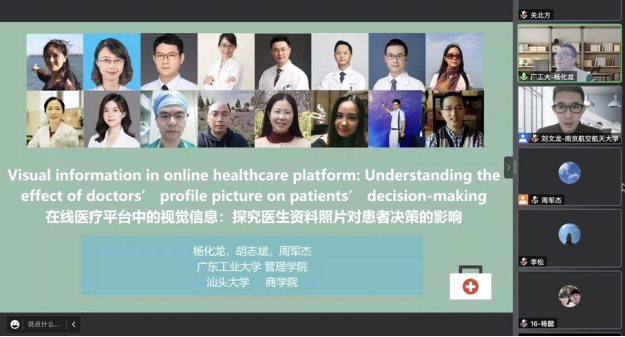
The second presentation was given by Professor Shan Liu from the School of Management, Xi'an Jiaotong University, on the topic of "Analysis and decision making of doctor-patient interaction driven by online health data fusion". Professor Liu Shan introduced the traditional medical model, which is disease-centric and symptom-based, and the modern health model, which is patient-centric and human-centered. The main contradiction is the imbalance between supply and demand between personalized needs and limited medical resources, and the information asymmetry that hinders doctor-patient interaction and communication. The key to solving this problem lies in the integrated online and offline service model and the use of internet health platforms to enhance doctor-patient communication. Professor Shan Liu used five studies to clarify the impact of patients' recommended search behavior, online consultation and consultation behavior, doctors' voice interaction behavior, doctors' speech behavior, and doctors' language style on the doctor-patient relationship. In the interactive discussion session, Professor Shan Liu gave detailed answers to the questions raised, including the acquisition of labeling data and the accuracy of classification for the studies.
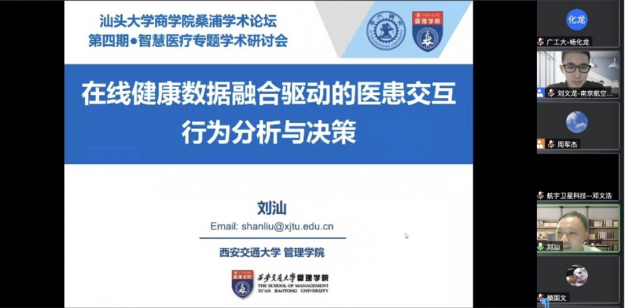
The third presentation was given by Wenhao Deng, general manager of Guangdong Aisu Satellite Technology Co., Ltd. on the theme of "Digital Transformation Practice of Medical Services", which started from four aspects: experience summary, dynamics of hospital digital transformation, Aisu Satellite Technology's medical digital transformation practice and considerations for enterprise digital transformation. The report emphasizes that "digital transformation" is a relatively complete reshaping of the entire business process, rather than a simple technology upgrade. The implementation of the new health care reform policy has brought about tremendous operational pressure to stimulate the digital transformation of traditional hospitals, and Avion Satellite Technology has cooperated with the First Affiliated Hospital of Shantou University as a pioneer and has already carried out practice in the Internet hospital platform, prescription flow platform, hospital power manager, hospital equipment manager, medical supplies SPD, etc., to upgrade the whole business process of the hospital and promote its cost reduction and efficiency process. Finally, General Manager Wenhao Deng also mentioned several considerations for enterprises to participate in digital transformation and called on the majority of technology enterprises to actively assume social responsibility and assist hospitals to return to the main business of diagnosis and treatment, so that healthcare can truly benefit people's livelihood.
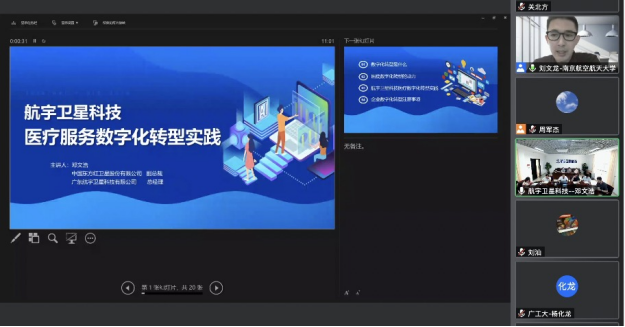
The fourth session was presented by Professor Xiaoling Jin from the School of Management, Shanghai University, with the theme of "Empowerment of Mobile Medical Platforms on Users' Subjective Well-being in the Context of the Epidemic". The presentation focused on the empowerment mechanism of mobile medical platforms in the context of the epidemic and creatively introduced the concept of "psychological empowerment of mobile healthcare users" (PEMU). A quantitative-qualitative sequential mixed research approach found that PEMU is driven by three technical factors perceived response efficacy, ease of use, and mobile medical platform quality, acting on users' subjective perceptions - generating vitality or relieving stress. Further research found a significant moderating effect of event criticality in this mechanism of action. This study is of great theoretical and practical significance and will help to promote the improvement and development of mobile medical platforms.
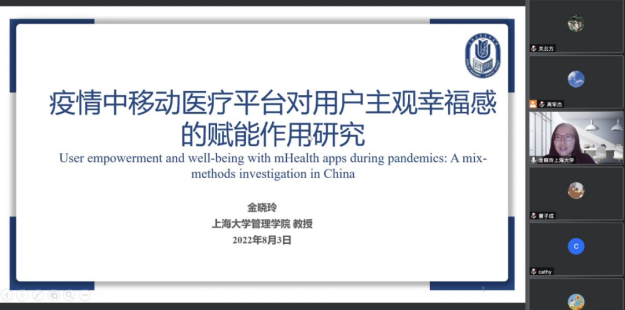
The fifth presentation was given by Lecturer Zicheng Cao from the School of Public Health, Shantou University, Shantou, China. The presentation was entitled "Dynamic non-pharmacological interventions and optimization of vaccine strategies affecting the multipeak effect of COVID-19 in multiple countries". Multiple comparisons, such as before and after vaccine implementation and between epidemic single- and double-peaked countries, were used to explore the effect of non-pharmaceutical interventions on the spread of the epidemic and to uncover the important drivers. The effects of variant strains and vaccine doses on epidemic transmission are also presented, both of which have implications for the development of dynamic non-pharmaceutical interventions and the optimization of vaccine strategies. Finally, the report also integrates multidimensional factors to make short-term projections of epidemic rebound in each country, and projections of the impact of vaccination with NPI implementation on disease burden, etc. In the interactive session, Dr. Cao answered questions on the significance of the definition of epidemic single bimodal peaks for public health.
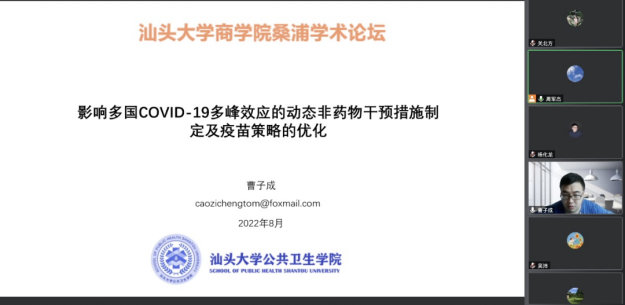
The sixth presentation was given by Xiaofei Zhang, Associate Professor of Nankai University Business School, with the theme of "From Practice to Practice - An Empirical Study Based on Ali Health". Associate Professor Xiaofei Zhang introduced the interaction process of Internet healthcare and the advantages and problems of Internet healthcare in the context of the times. Starting from the problems, he launched three research modules from the perspectives of doctor motivation, patient acquisition, and doctor-patient interaction, and conducted an in-depth investigation into the series of problems of Internet platform operation, which provided references for solving the practical problems in the operation of Internet healthcare apps such as Ali Health. Finally, he introduced the practical process and effectiveness of this series of research in detail, showing the real "write the thesis on the motherland".
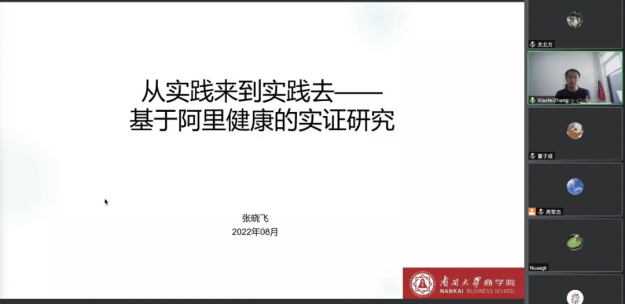
The forum was successfully concluded by Associate Professor Junjie Zhou from School of Business Shantou University. Through the academic discussion on the topic of "Wisdom Medical", the forum helped to advance the research and practice of wisdom medical in China, promote the communication and collaboration between scholars at home and abroad, and expand the academic influence of Business School in China. It is believed that with this forum as an opportunity, young scholars and postgraduates will inspire more enthusiasm in research and climb to the top of the academic path.